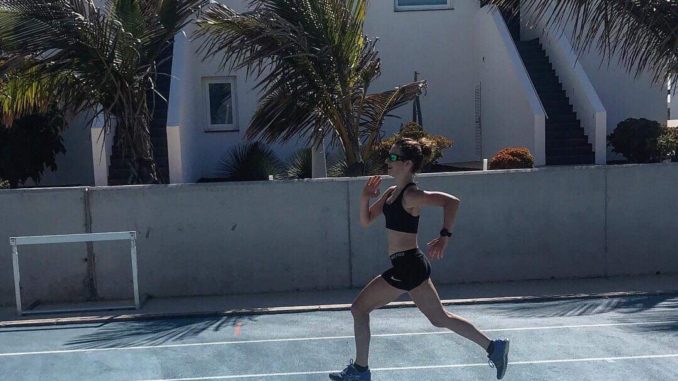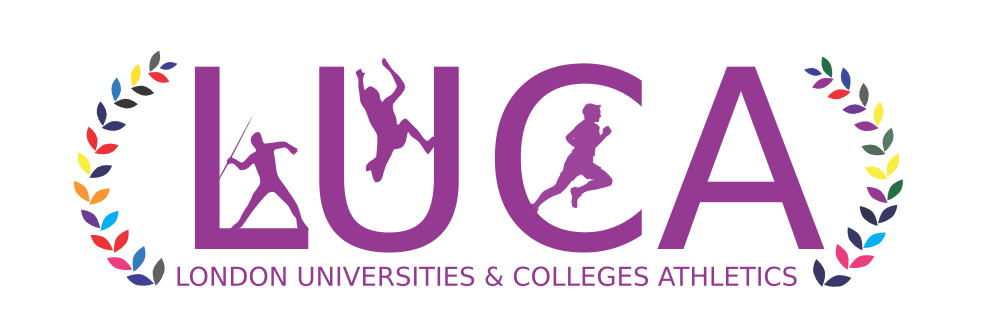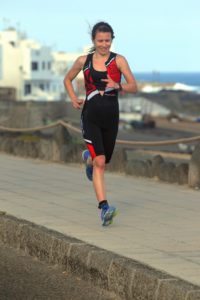
This article discusses eating disorders. If you are affected by anything mentioned here, you can find support links at the bottom of the page.
My name is Ula and I am in my second year at King’s studying nursing, as well as being a committee member for King’s Athletics & XC as welfare secretary. I am a long distance runner and am currently training for Edinburgh Marathon in May this year, raising money for the eating disorder (ED) charity BEAT.
I have always been active and participated in sport from a young age but was never competitive, and only became more serious about training when I came to university. Prior to that I loved playing netball and taking part in road races for fun.
The road that I have travelled as an athlete has been anything but smooth and has included significant diversions and long breaks, largely due to developing an ED at the age of 15 and subsequently facing burnouts, injuries and mental blocks leading me to lose my love and passion for the sport.
My ED seriously impacted my relationships with family and friends, my academic performance, ability to exercise and of course my health, effectively stripping me of everything that I cared about. It started off as an effort to self-improve and spiralled into self-destruction. I knew something was wrong but I did not know how deep I was in the illness until I tried to get out and realised I could not. The illness had control of all aspects of my life. It was a lonely and miserable time.
In school I was contacted by a girl a few years above me who suffered from an ED, who sent me a letter saying she was worried, and had been through the same thing. After avoiding the subject for so long and convincing myself I was fine, I tried to ‘recover’ when I was in year 11. The truth is I had no idea what I was doing; I managed to regain some weight, but my mind-set was still very unhealthy because I never attempted to tackle the underlying issues which caused the ED in the first place.
“I knew something was wrong but I did not know how deep I was in the illness until I tried to get out and realised I could not.”
I struggled throughout my A-levels. During this time I had been running on and off participating in road races, but in year 13 I got injured and I could not run for three months. Meanwhile, I left my part time job and isolated myself in the library, determined that I would succeed in my A-levels. Not being able to run, I lost a lot of my motivation to stay healthy. I started to try and restrict my intake and lose weight, but I found I couldn’t do it. I would end up binging on large amounts of food. I started purging too. Initially, it was once a week thing but soon spiralled out of control. I became very addicted to this behaviour, using it as a way to cope with difficulties in all areas of my life. I was still within a ‘healthy’ weight range, so it went unnoticed but I began to really struggle with concentration and the urge to binge/purge was overwhelming.
It was like living a double life – on the outside I was a high achiever who seemingly had it all together, whilst on the inside I was isolated in my disorder and living in a very unhealthy way. The few weeks after A-Levels were some of the worst few weeks of my life; my parents had found out about my bulimia and life at home was difficult. I desperately tried to stop purging but I couldn’t. I had been in Poland with my parents but came home on my own for results day and spent the last 3 weeks of summer alone at home. These few weeks were a blur. I felt awful, I had no energy and was terrified of fainting at work, I wasn’t sleeping in the fear of my heart stopping because my heart rate was so low, experiencing muscle cramps and hair loss… it was terrible! I was scared, yet unable to get out of this awful cycle. By this point I had stopped any exercise. I did not have any energy for it.
I took a gap year and sought professional treatment with the Adult Eating Disorder Services. I worked with a clinical nurse specialist, restoring my weight and also addressing the underlying issues which were keeping the ED alive. Tackling the underlying issues was tough, involving facing up to things I did not want to face up to and having to accept myself. It meant rewiring my brain and completely changing my way of thinking. I felt a lot of grief during this period, often comparing trying to escape from the ED to trying to break away from a toxic friendship/relationship.
“I was scared, yet unable to get out of this awful cycle.”
Letting go of the ED was tough. I took on a lot of shifts at work and just did anything to keep me distracted and out of the house. My relationship with my parents was difficult during this time, especially because they had little to no understanding of EDs prior to my diagnosis. I went through intense periods of hunger, eating thousands of calories a day and gained weight rapidly, causing the physical symptoms such as swelling and severe bloating, lethargy, night sweats and weight gain that were so hard to cope with. I would often feel more depressed in recovery than when I was deep in my ED, forever with this great sense of loss hanging over me. I felt like I had lost my identity.
I believe it is crucial in ED recovery to fill life with things that truly matter, things that have meaning. One of my biggest fears during recovery was what will happen when I no longer have an ED? Who will I be? What if I can’t handle the expectations? What if nothing changes? How do I create a life worth living?
As my health improved I began to feel more alive and started running again, completing a half marathon in May of my gap year (2017). When I went to university I began to struggle again. Although I had made great strides in recovery I still had a lot of unhealthy coping mechanisms, many of which were related to perfectionism and not being able to rest after running despite doing 12.5 hour placement shifts. As a result, I totally burnt out in first term of first year, and this also confounded my long standing issue of shin splints, as I refused to take time off when they started to get bad again.
Running took the place of my ED in many ways, helping me to cope with anxiety and depression, so when I finally gave in and took a break to recover from shin splints, the dark, negative thoughts were overwhelming. The next few months were spent cross training like crazy!
In April 2018 I started running again and took part in some LUCA races only to find that I could not run. I was so desperate to get back to the runner I used to be that I would have panic attacks and could not relax and enjoy it (if you’ve seen a girl crying on the side of the track at any LUCA races, it was probably me!). I struggled a lot with the thought that I could not run well simply because my weight was much higher than when I was 16/17, when I was underweight and ran many of my PBs. Of course I knew the thought was irrational but that didn’t stop me from believing it to be true.
Gradually I began to relax more but I was still very rigid with training and struggled to balance it with placement, ending up tired and burnt out once again. During summer 2018, I saw a glimmer of hope and overcame many mental blocks only to get shin splints again in September because of running in different shoes. I gave up sport completely this time and did not even bother to cross train. A lot of things happened and the next three months were some of the darkest I have ever been through – I was at serious risk of relapsing.
In December 2018 I decided to give running another go. I had recovered from shin splints (again!) and had been forced to address a lot of issues still remaining from the ED. In a way, taking a three month complete break from sport was a blessing in disguise and made me realise just how unhealthy my behaviours around running and rest (or rather lack of it) had been. I started off very tentatively, running only for 20 minutes at a time. I was glad to be back to running but I was very paranoid about getting injured (again…).
Gradually I built up a running base and began to add in speed-work. I was frustrated at times as I did not feel like I was making progress but I was so glad to be running that it did not matter to me as much as before. I took the focus away from achieving certain times and instead tried to focus on just completing sessions as best as I could and enjoying myself.
Over the last few weeks something has clicked! My running feels great and I am making progress that I have not seen in years. For the first time in what seems like forever I am genuinely enjoying running and doing it for the right reasons. I am much more flexible with running, substituting sessions for easy runs or complete rest days when I am tired and adapting my training to fit the demands of my Nursing Degree. I am running hard but resting and eating harder.
“I took the focus away from achieving certain times and instead tried to focus on just completing sessions as best as I could and enjoying myself.”
I have made a lot of positive steps but over the last few weeks I have still had wobbles nonetheless. I still struggle with comparing myself to others, particularly my boyfriend despite knowing we are clearly not comparable. I occasionally slip into my old mentality of believing that being smaller means I will be a better runner and a better person. The difference now is that I can identify these thoughts and rather than acting on them in a unhealthy way I seek support from those around me.
If you are reading this and thinking my progression since December has been easy, you would be totally wrong. I do at times still go into a very black and white mind-set, thinking I can never get back up and continue. Sometimes when I am doing better eating wise other mental health issues can become more prominent and I am trying to work through these. Despite this, I am in the healthiest and happiest place I have ever been both physically and mentally as well be being in the most balanced place I have ever been in terms of recovery, work, university, training and relationships.
“Recovery is not the absence of negative thoughts but rather the resilience to rationalise and fight against them.”
Being an athlete after having an ED is tough. I still struggle sometimes with how much I need to eat to maintain my weight, often comparing myself to the ‘average’ person. I have not weighed myself in quite a while and the ability to trust my body and eat intuitively is something I am still working on. ‘Runger’, or running hunger is definitely something I have anxiety over, particularly as I enter into marathon training, but I am determined to push though the uncomfortable feelings. Recovery is not the absence of negative/ED thoughts but rather the resilience to rationalise and fight against them.
Although the process of recovery and reclaiming running from the ED has been painfully hard, I would not be doing what I am today had I not taken a leap of faith and fought against it. I am so grateful for the wonderful friends I have, both old and new, who have supported me through some of the most difficult times. I would like to give a special mention to my amazing boyfriend Jamie, who is always supporting me, teaching me the art of rest and recovery and reminding me which way is up when I get a bit confused. My recovery has not just been about my life but also realising the consequences of my ED on others, and this is one of my main motivations to stay healthy. I want to be healthy so I can also be there for others – not only my friends and family, but also my patients when I am a qualified nurse.
To anyone struggling, I would encourage them to seek help. It doesn’t matter if you have struggled for weeks or for years, recovery is possible and no matter where you are in your journey you deserve to be helped.
“Recovery itself is a very unglamorous daily process of being willing to fall down again, to break again, to cry again, to get up and try yet again until ‘success’ manifests as ever-greater sustained healing.” – Shannon Cutts
Find my Edinburgh Marathon sponsorship page here
If you have been affected by any of the issues discussed here, you can access support at:
Beat, an eating disorder charity: www.beateatingdisorders.org.uk
Mind, the mental health charity: www.mind.org.uk/information-support/types-of-mental-health-problems/eating-problems/about-eating-problems/
Student Minds: www.studentminds.org.uk
Find your university’s mental health services at: www.london-athletics.com/clubs/runmyclub/your-health/ , or alternatively check your student union’s website or health centre
If you’re struggling, go and see your GP. If you’re not registered at uni, you can find nearby surgeries at www.nhs.uk/service-search/GP/LocationSearch/4

